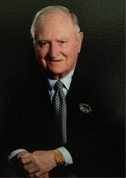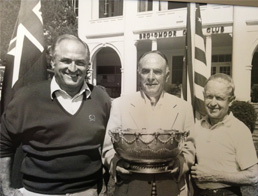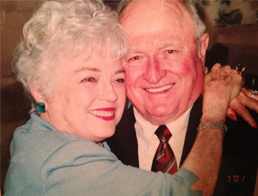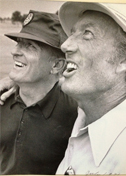© 2013 The Texas Lawbook.
By Patricia Baldwin
Lifestyle Writer for The Texas Lawbook
Attorney Richard Jennings of Lubbock doesn’t believe in retirement – “as long as your health is good and your mind is clear.” His philosophy: If you’ve been doing what you love all your life, why change? If you haven’t been doing what you love, then you’ve been doing the wrong thing.
In September, Jennings will mark 70 years as a member of the State Bar of Texas. In November, Jennings will celebrate his 96th birthday. Straightforward and plain talking, he offers more anecdotes per conversation than perhaps his anniversaries combined.

Jennings continues his tax and estate-planning work for clients he can now count on two hands – some representing the fourth generation of their families. He hasn’t had a new client in a couple of decades. (“I don’t want one,” he says.) He doesn’t keep track of billable hours because he doesn’t bill clients. (“I’ve got enough money.”) And he doesn’t use the Internet for research, preferring to read “page-by-page” reference material provided by Looseleaf Law Publications. (“I’m old-fashioned.”)
He has befriended statesmen, celebrities and athletes. He’s rumored to have made a few Internal Revenue Service agents tremble during a client audit. He’s raised nine children and, at last count, enjoys 23 grandchildren and 31 great-grandchildren. Since his wife of 61 years, Dorothy, died last fall, he focuses his personal time on his longtime passion for golf and his German Shepherd, DJ.
He seemingly voices a single complaint: His doctor has retired.
Tom Pitts of Splawn Simpson Pitts in Lubbock is Jennings’ personal lawyer.
“He’s a super guy,” Pitts says. “But for a number of years, before I really knew him, I thought ‘that old man is crusty.’ When you’re an attorney, he’s going to grade your paper.”
Pitts describes Jennings as “passionate about his law practice, taking care of clients and his family.”
He adds, “If he likes you, he’s extremely loyal.”
Jennings’ best-guess as to the secret of his longevity involves “good genes.” His father, a highly touted college coach, died at age 95; his mother, at 90. He’s not interested in writing his epitaph – he’s got plenty of other things to do. And, please, if you’re going to call about business, do so in the morning, or he’s likely to be on the links at Hillcrest Country Club, where his once-upon-a-time minus-two handicap regrettably has risen to “four or five.”
Hillcrest is where Jennings could be found on a recent (and hot) summer weekend, playing in a stroke-play tournament with his son David.
“He had just finished 18 holes at 7 p.m. the day before, and he was the first one on the practice tee the next morning,” the younger Jennings recounts. “I don’t know how many 95-year-old men play a three-day, 54-hole medal play tournament. I doubt there are many.”

Daughter Nancy Klein’s opinion: “This guy has done it all.” But that sounds more like the end of a story.
Jennings begins his tale during his college years at Baylor University in Waco where he received his undergrad degree and where his father, Morley, was football coach, athletic director and professor of geometry and calculus.
Jennings’ father, who was inducted into six Halls of Fame, not only introduced his only child to golf, but also to the discipline involved in athletics.
“I grew up around football players in training,” Jennings recalls. His father’s “whole concept was ‘do anything but in moderation.’”
Jennings also remembers, “Back in the ‘30s, the depression was pretty bad in Waco.”
An accountant, who lived across the street from the family, talked to Jennings about the new and growing field of taxation – an interest that stuck.
Under the patronage of Texas Senator Tom Connally, Jennings worked in Washington, D.C., while attending law school at George Washington University. Twin sons were born in August 1941 to Jennings and his first wife, Ruth. (The couple divorced later that decade.) He recalls taking (and passing) the Texas Bar exam before his 1942 graduation, during a break when he was visiting his parents. Official State Bar records, however, date his membership from September 1943.
After Pearl Harbor, he worked for the forerunner of the IRS and was subsequently drafted in 1943. After the war, he stayed with the government’s revenue service and was assigned to Kansas City. His government pay – “$3,500 a year as I recall” – was low so Jennings was receptive when Dallas-based Thompson & Knight contacted him. The law firm’s top tax lawyers – Paul Jackson and Sam Winstead – had left to form their own firm.
Jennings stayed almost two years, but didn’t like the “big” firm, with 45 attorneys at the time. He decided to go on his own and looked at West Texas, partly because his parents had moved to Lubbock. (His father completed a 54-year coaching career at Texas Tech University.)
Mostly, however, Jennings realized how much World War II and subsequent legislation had increased both personal and corporate taxes. He recognized the need for legal tax expertise, especially outside Texas’ largest metropolitan areas.
“Lubbock was a growing town. There were some accountants, a bunch of bookkeepers,” he recalls. The practice of tax law, however, was wide open.
In 1948, Jennings opened his own practice. In 1951, he married Dorothy. The practice and his growing family thrived along with their new hometown. Jennings’ varied interests also led him to pioneering in more than his chosen area of the law.

In the mid-1950s, Jennings played in a prestigious pro-am golf tournament in Odessa with professional golfer Don January. Their team won, and the acquaintanceship, which January dates to the days he played the “Barbecue Circuit,” became an enduring friendship.
“Dick was always prevalent in my decision-making. When I wanted to know something about finances, I’d call Dick. He was an influence on me,” says 83-year-old January from his Dallas home. “To me, he is an icon, a one-of-a-kind.”
In the late 1960s, January retired from the PGA Tour to launch a career in golf architecture, with Jennings as an investor and financial consultant. Their first project was Royal Oaks Country Club in Dallas. Another dozen courses followed, with the January-Jennings duo variously serving as developers, owners or operators. Their work was halted by the oil embargo.
“You couldn’t get gasoline. Everything changed for about five years,” Jennings says.
To earn a living, January needed to play golf again.
“I was 45 years old and still had three kids to go through college,” January says.
Eventually, January and Jennings considered the question: Was there a market for the older players?
At the time, the Senior PGA Championship was the only high-profile tournament for golfers over 50. Then, in 1978, NBC televised a new event called the Legends of Golf. With a putt on Hole 18, Sam Snead and his partner Gardner Dickinson won that initial event over the Australian team of Peter Thomson and Kel Nagle.
The winners split the $100,000 purse. The viewers cemented the success of the team event, currently the Liberty Mutual Legends of Golf.
By 1980, the idea for a formal senior tour grew into the Senior PGA Tour, now the Champions Tour.
January notes the initial two tournaments in 1980 had grown to 14 in 1983. “It grew up,” he says, and modestly muses, “We assumed it would have happened anyway.”
Jennings adds, “It expanded so fast. It was amazing.”

For January, the rapidly expanding Senior PGA Tour meant he did not have to play both tours to make a living.
Reflecting upon the evolution of professional golf, January laughs. He remembers his first year on the PGA Tour. “I won once, tied twice and finished 16th on the money list. I made $16,000 and cleared $2,000.”
January and Jennings continue to be in touch several times a week.
“Dick recently sent me an article,” January says. “It said the Tour is playing for $290 million this year. Good gawd almighty.”
For Jennings, the association with competitive golf brought him friendships with many of the game’s greats.
Jennings, however, has been an equal-opportunity sports fan. Because he represented Bobby Layne’s in-laws, he helped the pro footballer with his 1948 income tax return – the Chicago Bears had paid Layne a whopping $25,000 bonus. That was the start of another longtime friendship. (Layne’s longest team stint was with the Detroit Lions from 1950-1958. He was inducted into the Pro Football Hall of Fame in 1967 and the College Football Hall of Fame in 1968. He died in 1986 at age 59. )
But neither money nor fame inhibited Layne and Jennings from rummaging around a ranch house one Saturday night when they ran out of alcoholic mixes.
“We found canned apple juice in the pantry,” Jennings says. The two mixed the juice with vodka until they had the right proportions. They decided they had “one hell of a drink,” which they christened the “Apple Knocker.” They later liked to puzzle bartenders with requests for the cocktail.
“Dick has a great sense of humor,” says Rod Mitchell, founder of the Houston-based Mitchell Group, an investment firm that provides equity management services related to the energy industries. He first met the Lubbock attorney when he represented Mitchell’s father.
When asked to describe Jennings, Mitchell refers to a volume on his bookshelf entitled “Morley Jennings: The Builder of Men” written about Richard Jennings’ father. The 1986 book by Dana Olmstead records the elder Jennings’ half-century career as a college football coach.
Mitchell says he sees the coach’s influence on his son.
One passage in the biography recounts the coach’s 1941 farewell speech to Baylor football players. The father’s advice obviously guided not only the athletes but also his son:
“The world always rewards the fellows who do all they are told to do and a little extra.”
Do you have a special avocation, hobby or other lifestyle interest to share? Please email patricia.baldwin@texaslawbook.net
© 2013 The Texas Lawbook. Content of The Texas Lawbook is controlled and protected by specific licensing agreements with our subscribers and under federal copyright laws. Any distribution of this content without the consent of The Texas Lawbook is prohibited.
If you see any inaccuracy in any article in The Texas Lawbook, please contact us. Our goal is content that is 100% true and accurate. Thank you.
